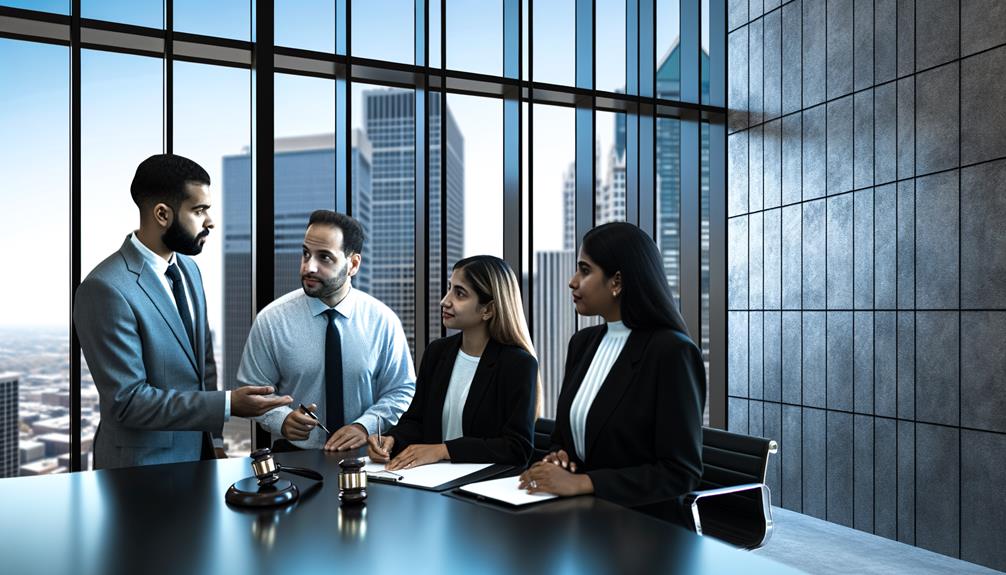In Chicago, you can access free lawyer consultations that cover a range of legal issues from family law and personal injury to employment disputes and bankruptcy. These initial meetings allow you to understand a lawyer's approach and discuss your case specifics in detail. You'll find these services at legal aid societies, pro bono clinics, law school programs, and community centers, providing essential early legal advice. Prepare for your consultation by organizing relevant documents and outlining your questions and goals. This preparation guarantees productive discussions, setting the stage for possible collaboration. Exploring further can greatly enhance your grasp of available legal options and strategies.
Key Takeaways
- Free consultations in Chicago cover legal issues like family law, personal injury, and immigration.
- Legal aid societies and pro bono services provide no-cost legal advice.
- Law schools in Chicago offer free legal counsel through student-run clinics.
- The Chicago Bar Association provides referrals to attorneys offering reduced-rate consultations.
Understanding Free Consultations
When you're exploring legal options, a free consultation can help you gauge how a lawyer might handle your case. It's a prime opportunity to assess whether their expertise aligns with your needs and to clarify your own client expectations. During this initial meeting, it's essential to come prepared with all relevant documents and a clear outline of your situation. This preparation not only facilitates a more productive discussion but also allows the lawyer to offer more precise advice.
Understanding consultation etiquette is equally important. You should treat the consultation as a professional meeting. Punctuality, respectfulness, and organization reflect well on you and can set the tone for the interaction.
Be straightforward about your goals and concerns, and listen attentively to the lawyer's feedback. This mutual respect guarantees that both parties are on the same page and can work together effectively if you decide to proceed.
Types of Legal Issues Covered
You'll find that free lawyer consultations in Chicago cover a broad range of legal issues, from family law and personal injury to employment disputes and bankruptcy.
If you're entangled in criminal defense matters, seasoned attorneys are ready to dissect your case, ensuring you understand the charges and possible defenses. Family law issues, including divorce and custody battles, demand a sensitive yet firm approach, which these consultations can initiate.
Personal injury claims, often complex, require expert navigation to secure the compensation you deserve. Legal experts in these sessions will assess the merits of your case and advise on the next steps.
For those embroiled in business disputes, guidance on contract issues, partnership disagreements, or intellectual property rights can be invaluable, setting a clear path forward.
Moreover, if you're facing challenges related to immigration issues or employment rights, such as visa applications or workplace discrimination, these free consultations provide an essential first look at your legal options.
Real estate matters, including disputes over property ownership or tenant rights, also fall under the umbrella of services offered during these initial legal consultations.
Where to Find Free Consultations
Finding free lawyer consultations in Chicago is straightforward, with numerous legal aid societies and pro bono services offering initial advice at no cost. You'll find that these organizations are pivotal in bridging the gap between qualified legal professionals and individuals requiring guidance without financial burden. Leveraging these community resources can be your first step towards resolving legal issues effectively.
Legal aid foundations, such as Chicago Legal Aid, often host clinics and offer services that cater specifically to low-income residents. These foundations typically employ attorneys who specialize in areas like family law, immigration, and tenant rights. They're not just there to offer advice; they provide extensive support, guiding you through the complexities of your legal concerns.
Additionally, many law schools in the Chicago area run legal clinics. These clinics are staffed by law students who are supervised by experienced attorneys. While these services are educational tools for students, they also offer quality, no-cost legal counsel to the community. It's a win-win situation: you receive essential legal help, and law students gain invaluable practical experience.
To maximize these opportunities, tap into local community centers and online directories. They often list upcoming legal workshops and clinics, ensuring you're informed about available services. Remember, accessing these resources early can meaningfully influence the outcome of your legal situation.
Preparing for Your Consultation
Once you've located a free consultation service, it's important to prepare effectively to make the most of this opportunity. You'll need to set clear client expectations and guarantee thorough document preparation.
Start by defining exactly what you hope to achieve from the consultation. Are you seeking specific legal advice, understanding of the legal process, or representation possibilities? Clarifying your goals will guide the consultation's focus and enhance its productivity.
Next, gather all relevant documents related to your legal issue.
Read also this article
This may include contracts, correspondence, court notices, and any other paperwork that could impact your case. Organize these documents chronologically and make notes on key points and dates. This preparation allows the lawyer to quickly understand the context of your situation, which is essential for providing accurate and relevant advice.
Additionally, prepare a list of questions you have about your case or legal concerns. This guarantees you won't forget to address important issues during the consultation. Remember, this is your time to gain insights and direction, so maximizing it with prepared questions can greatly influence the outcome.
What to Expect During the Consultation
During your free consultation, you'll first discuss your legal issue in detail, allowing the lawyer to evaluate the specifics of your case.
Next, you'll be guided through the consultation process, which outlines the steps your lawyer will take to assist you.
This overview guarantees you're well-informed about how your case will be handled moving forward.
Legal Issue Evaluation
You'll explore the details of your legal issue when you meet with a lawyer in Chicago for a free consultation. This initial meeting is essential as it helps you understand the scope of your legal rights and the responsibilities your attorney must uphold under attorney ethics. They'll assess the strength and weaknesses of your case, setting realistic expectations about possible outcomes.
During the consultation, your attorney will ask specific questions to better understand your situation. It's important to be prepared to discuss the facts of your case candidly. Here's a brief overview of what to expect:
| Aspect | Details |
|---|---|
| Case Review | Overview of factual and legal issues related to your case. |
| Legal Rights | Clarification of your rights and potential infringements. |
| Ethical Standards | Discussion on how attorney ethics may influence case handling. |
The attorney will use this information to formulate a strategy that aligns with legal precedents and ethical guidelines. Remember, this consultation sets the foundational strategy for any actions your lawyer might recommend taking. Make sure to ask questions and clarify doubts, as your understanding is critical for a collaborative legal process.
Consultation Process Overview
Understanding what happens in your free consultation can help you prepare effectively for the meeting. During this initial session, you'll get a chance to discuss your case in detail with a legal expert in Chicago. It's an essential time to establish client expectations and understand your legal rights.
Your lawyer will typically start by asking you to describe your situation. This is your opportunity to provide all relevant information, so they can assess the merits of your case. Be honest and thorough; the more your lawyer knows, the better they can help you.
Next, there'll be a discussion on your legal rights and the various paths you could take. Your lawyer will likely outline potential strategies and the outcomes you might expect. This part of the consultation is key to understanding how the law applies to your case and what your rights are in this situation.
Common Questions to Ask
When you're at your free consultation, it's essential to ask about the lawyer's fee structures and how they align with your budget and case type.
You should also inquire about the estimated duration of your case to set realistic expectations and plan accordingly.
These questions will help you assess whether the lawyer is the right fit for your legal needs.
Legal Fee Structures
Before signing any legal agreements, it's important to ask about the lawyer's fee structure to guarantee transparency and avoid surprises. Understanding how fees are calculated, what services they cover, and the terms of fee negotiation can help you manage your legal expenses effectively.
Billing transparency is critical in any legal service. You should know if you'll be charged on an hourly basis, a flat fee, or a contingency basis, where you pay only if you win the case. Each option has its benefits and potential drawbacks, depending on the complexity and length of your legal issue.
Here are some significant questions you should ask during your consultation:
- What is the estimated total cost of your services?
- How often will I receive billing statements?
These questions guarantee there are no hidden costs and that you remain informed throughout your case.
Always discuss the possibility of additional charges and confirm whether there are aspects like court fees or other disbursements that might be billed separately. This level of upfront clarity can prevent disputes over fees and helps maintain a good client-lawyer relationship.
Case Duration Estimates
You should ask your lawyer how long they expect your case to take, as estimating the duration can help in planning your legal strategy and managing expectations. Understanding case timelines is essential, not only for personal planning but also for setting realistic goals and preparing financially and emotionally for the process ahead.
Several factors influencing the duration of legal proceedings include the complexity of the case, the efficiency of the court system, and the strategies of opposing counsel. For instance, a straightforward contract dispute might resolve faster than a multi-faceted corporate litigation involving multiple parties and jurisdictions.
It's also important to take into account that external circumstances, such as changes in law or unexpected events, can extend or shorten the timeline. Don't hesitate to ask your lawyer for examples of similar cases they've handled and how long those took to resolve. This can provide a more concrete idea of what to expect.
After the Consultation: Next Steps
After your consultation, it's essential to review the lawyer's advice and decide on your legal strategy. This involves understanding the options presented and determining which path aligns best with your legal goals and personal circumstances.
Remember, the choices you make now could greatly influence the outcome of your case.
To guarantee you're on the right track, consider the following steps as part of your follow-up actions:
- Document Review: Thoroughly go through any documents or materials your lawyer provided during the consultation. Make notes of key points and areas where you need further clarification.
- Question List: Compile a list of questions or concerns that arose after the consultation. This will be vital for your next interaction with the lawyer to make sure nothing is overlooked.
As a client, it's your responsibility to stay proactive and engaged throughout the legal process.
Keep lines of communication open with your legal representative, and don't hesitate to reach out if you need additional guidance or if your situation changes.
Additional Resources in Chicago
Exploring additional legal resources in Chicago can provide you with extra support and information as you navigate your case. Beyond the initial free consultation, various local organizations offer continued legal aid for those who need it. Both non-profits and governmental bodies work to guarantee that you aren't left without assistance in the complex legal environment.
Firstly, the Legal Aid Chicago organization is a cornerstone of community resources, offering services ranging from civil cases to housing disputes. They're equipped to handle a variety of issues, which means you're likely to find help for your specific needs.
In addition, the Chicago Bar Association provides a lawyer referral service which can connect you with attorneys who volunteer to work at reduced rates or even pro bono, depending on your financial situation.
You shouldn't overlook smaller, neighborhood-based legal clinics either. These often hold regular sessions where lawyers offer free advice on everything from tenant rights to employment law.
Moreover, many local universities have law schools with clinics that provide free services to the community, giving you access to enthusiastic law students supervised by experienced attorneys.
Frequently Asked Questions
How Do I Verify the Credentials of a Lawyer Offering Free Consultations?
To verify a lawyer's qualifications, start by checking their bar membership through the state bar association's website. This guarantees they're licensed to practice.
Additionally, review any disciplinary history to gauge their consultation ethics.
You can also explore reviews and testimonials from past clients to assess their professionalism and ethical standards during free consultations.
Don't hesitate to ask the lawyer directly about their experience and credentials in your initial meeting.
Can I Switch Lawyers After a Free Consultation if Unsatisfied?
Yes, you can switch lawyers after a free consultation if you're unsatisfied.
Think of it like tasting a dish at a restaurant; if it doesn't meet your expectations, you're within your rights to choose another.
The lawyer-client relationship is essential for your confidence and satisfaction.
Make certain your consultation sets clear expectations, and don't hesitate to seek a better fit if the initial meeting doesn't align with your legal needs and comfort levels.
Are There Any Hidden Fees I Should Be Aware Of?
When considering a lawyer, it's essential to look out for hidden costs that mightn't be disclosed upfront.
Always read the consultation agreements carefully to understand all potential fees. These could include administrative fees or charges for additional services that aren't covered in the initial consultation.
Asking directly about any extra costs during your first meeting can help avoid surprises later on, ensuring you're fully informed before making any commitments.
How Confidential Is the Information Shared During a Free Consultation?
When you share information during a consultation, it's kept highly confidential due to strict attorney ethics rules.
These guidelines guarantee your details aren't disclosed, safeguarding your client privacy.
It's essential to understand that everything you discuss is protected under attorney-client privilege, even during an initial free consultation.
Always feel secure in the knowledge that your personal information remains private, fostering a trusting relationship from the start.
What Happens if I Miss My Scheduled Free Consultation?
If you miss your scheduled consultation, it's essential to check for rescheduling options immediately.
Most services are flexible and understand that plans can change.
Contact the office as soon as possible to inform them of the missed appointment and discuss available dates to reschedule.
This proactive approach will minimize any negative impacts and guarantee you don't lose the opportunity to receive the guidance you need.
Conclusion
You've explored how to leverage free legal consultations in Chicago effectively.
Remember, about 70% of people who utilize free consultations feel more confident managing their legal issues afterward.
As you move forward, prepare thoroughly and list your questions to maximize this opportunity.
Don't hesitate to access additional resources and follow up if needed.
This step could greatly influence your legal journey, turning uncertainty into actionable clarity.







